Nginx域名配置详细介绍
前言
Github:https://github.com/HealerJean
1、基本命令
1.1、启动
Linux ./nginx -c conf/nginx.conf
windows start nginx
1.2、停止
./nginx -s stop
1.3、有序退出
./nginx -s quit
1.4、配置修改后,重新载入
./nginx -s reload
1.5、重启
./nginx -s reopen
1.6、检测配置文件
./nginx -t
1.7、平滑重启
kill -HUP nginx进程号
kill -HUP '/var/run/nginx.pid"
当nginx接收到HUP信号时,它会尝试先解析配置文件(如果指定文件,就使用指定的,否则使用默认的),如果成功,就应用新的配置文件(例如:重新打开日志文件或监听的套接字),之后,nginx运行新的工作进程并从容关闭旧的工作进程,通知工作进程关闭监听套接字,但是继续为当前连接的客户提供服务,所有客户端的服务完成后,旧的工作进程就关闭,如果新的配置文件应用失败,nginx继续使用之前的配置进行工作。
2、属性解释
2.1、listen 监听的端口;server_name 建议的域名或者ip
2.2、autoindex on;
- 解释 :开启浏览功能,开启网站目录文件列表功能,访问目录时列出其中的文件列表,默认不开启
server {
listen 80;
server_name test.nginx.com;
root D:/nginx/;
# 开启网站目录文件列表功能,访问目录时列出其中的文件列表,默认不开启
autoindex on;
}
- 测试
http://test.nginx.com
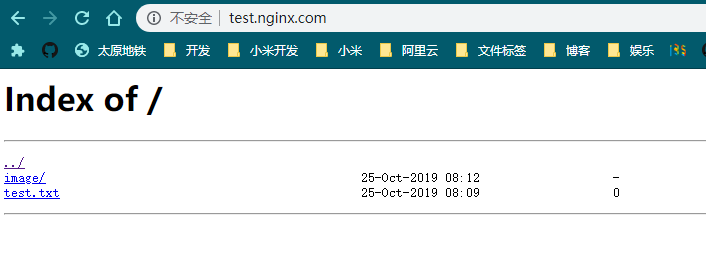
2.3、index
- 解释 :如果url没有匹配,则优先index文件,没有这个属性值也是默认会查找index.html文件
server {
listen 80;
server_name test.nginx.com;
root D:/nginx/;
index index.html index.htm;
autoindex on;
}
- 测试
我在root目录下放入一个index.html文件,并写入文件内容index
http://test.nginx.com
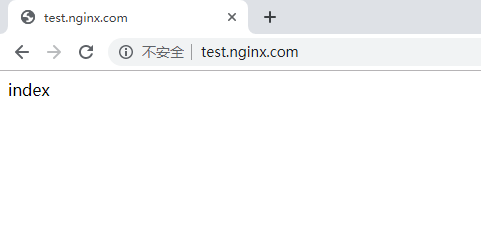
2.4、location匹配规则
2.4.1、匹配规则
| 模式 | 含义 |
|---|---|
| location = /uri | = 表示精确匹配,只有完全匹配上才能生效 |
| location ^~ /uri | ^~ 开头对URL路径进行前缀匹配,并且在正则之前。前缀匹配,如果有包含关系时,按最大匹配原则进行匹配。比如在前缀匹配:location /dir01 与location /dir01/dir02,如有请求 http://localhost/dir01/dir02/file 将最终匹配到 location /dir01/dir02 |
| location ~ pattern | 正则匹配:区分大小写的 |
| location ~* pattern | 正则匹配:不区分大小写的 |
| location /uri | 不带任何修饰符,也表示前缀匹配,在正则匹配之后 |
| location / |
2.4.2、匹配顺序
- 首先精确匹配
= - 其次前缀匹配
^~ - 其次是按文件中顺序的正则匹配
- 然后匹配不带任何修饰的前缀匹配。
- 最后是交给
/通用匹配 - 当有匹配成功时候,停止匹配,按当前匹配规则处理请求
2.4.3、测试
location = / {
echo "规则A";
}
location = /login {
echo "规则B";
}
location ^~ /static/ {
echo "规则C";
}
location ^~ /static/files {
echo "规则X";
}
location ~ \.(gif|jpg|png|js|css)$ {
echo "规则D";
}
location ~* \.png$ {
echo "规则E";
}
location /img {
echo "规则Y";
}
location / {
echo "规则F";
| url | 匹配规则 | |
|---|---|---|
| http://localhost/ | A | |
| http://localhost/login | B | |
| http://localhost/register | F | |
| http://localhost/static/a.html | C | |
| http://localhost/static/files/a.exe | X | 虽然 规则C 也能匹配到,但因为最大匹配原则,最终选中了 规则X |
| http://localhost/a.gif | D | |
| http://localhost/static/c.png | C | 规则C顺序优先 ,规则E不起作用 |
| http://localhost/a.PNG | E | 规则 E 不区分大小写。 |
| http://localhost/img/a.gif | D | 虽然 规则Y 也可以匹配上,但是因为正则匹配优先,而忽略了 规则Y。 |
| http://localhost/img/a.tiff | Y |
2.5、 日志记录
2.5.1、默认日志
虽然下面的log_format的注释没有打开,但是也是有日志查看的在logs文件夹下,下面的log_format开启是自定义日志支持
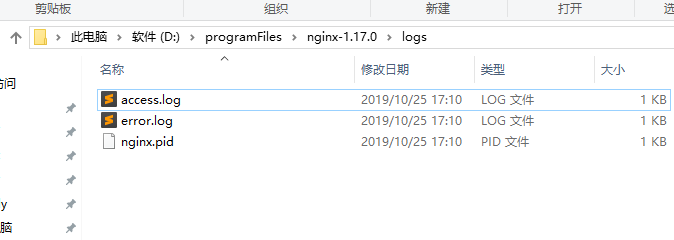
2.5.2、打开自定日志支持
log_format main '$remote_addr - $remote_user [$time_local] "$request" '
'$status $body_bytes_sent "$http_referer" '
'"$http_user_agent" "$http_x_forwarded_for"';
2.5.2.1、自定义日志的目录和文件
配置自定义日志之后,我们访问当前的server就不会进入上面的日志文件中了
server {
listen 80;
server_name test.nginx.com;
access_log D:/nginx/log/access.log ; //默认是main级别的,我们一般生成设置这个就可以了
root D:/nginx/;
index index.html index.htm;
}
127.0.0.1 - - [25/Oct/2019:17:14:09 +0800] "GET / HTTP/1.1" 304 0 "-" "Mozilla/5.0 (Windows NT 10.0; Win64; x64) AppleWebKit/537.36 (KHTML, like Gecko) Chrome/77.0.3865.120 Safari/537.36"
127.0.0.1 - - [25/Oct/2019:17:14:12 +0800] "GET /1111111111111 HTTP/1.1" 404 555 "-" "Mozilla/5.0 (Windows NT 10.0; Win64; x64) AppleWebKit/537.36 (KHTML, like Gecko) Chrome/77.0.3865.120 Safari/537.36"
2.5.2.2、添加多个自定义级别
server {
listen 80;
server_name test.nginx.com;
access_log D:/nginx/log/access.log main;
error_log D:/nginx/log/error.log warn;
root D:/nginx/;
index index.html index.htm;
}
分别访问正常的url和错误的404url


- access.log
127.0.0.1 - - [25/Oct/2019:17:26:53 +0800] "GET / HTTP/1.1" 304 0 "-" "Mozilla/5.0 (Windows NT 10.0; Win64; x64) AppleWebKit/537.36 (KHTML, like Gecko) Chrome/77.0.3865.120 Safari/537.36" "-"
127.0.0.1 - - [25/Oct/2019:17:28:19 +0800] "GET /1111111111111 HTTP/1.1" 404 555 "-" "Mozilla/5.0 (Windows NT 10.0; Win64; x64) AppleWebKit/537.36 (KHTML, like Gecko) Chrome/77.0.3865.120 Safari/537.36" "-"
- error_log
2019/10/25 17:28:19 [error] 7856#9844: *2 CreateFile() "D:/nginx/1111111111111" failed (2: The system cannot find the file specified), client: 127.0.0.1, server: test.nginx.com, request: "GET /1111111111111 HTTP/1.1", host: "test.nginx.com"
2.6、自定义错误页面
注意目录和文件名
error_page 500 502 503 504 /50x.html;
proxy_intercept_errors on;
location = /50x.html {
root html;
}
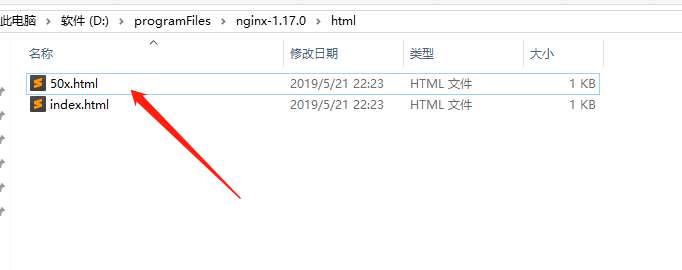
server {
listen 80;
server_name test.nginx.com;
access_log D:/nginx/log/access.log main;
error_log D:/nginx/log/error.log warn;
root D:/nginx/;
index index.html index.htm;
error_page 500 502 503 504 /50x.html;
proxy_intercept_errors on;
location = /50x.html {
root html;
}
}
2.7、alias 别名(注意是目录)
location /name/ {
alias /home/www/huan/;
}
访问http://test.nginx.com/name/a.html实际指定的是/home/www/huan/a.html。
注意:alias指定的目录后面必须要加上"/",即/home/www/huan/不能改成/home/www/huan
上面的配置也可以改成root目录配置,
location /name/ {
root /home/www/;
}
2.8、控制站点访问
# 控制站点访问
location /NginxDeny {
deny 127.0.0.1;
allow 128.163.0.0/24;
allow 128.163.1.1;
deny all;
}
2.9、nginx地址重写
-
last: 本条规则匹配完成后,继续向下匹配新的location URI规则
-
break:本条规则匹配完成后,终止匹配,不再匹配后面的规则,浏览器地址栏URL地址不变
-
redirect:返回302临时重定向,浏览器地址会显示跳转后的URL地址,返回302状态码
-
permanent:返回301永久重定向,浏览器地址栏会显示跳转后的URL地址,返回301状态码
302临时性重定向:对旧网址没有影响,但新网址不会有排名 ,301永久性重定向:新网址完全继承旧网址,旧网址的排名等完全清零
2.9.1、last和break区别和联系
-
last 和 break 当出现在location 之外时,两者的作用是一致的没有任何差异。
-
last 和 break 当出现在location 内部时,两者就存在了差异
last: 使用了last 指令,rewrite 后会跳出location 作用域,重新开始再走一次刚刚的行为,
break: 使用了break 指令,rewrite后不会跳出location 作用域。它的生命也在这个location中终结。
last: 重新将rewrite后的地址在server标签中执行,last一般写在server和if中,而break一般使用在location中
break: 将rewrite后的地址在当前location标签中执行
2.9.1.1、测试
在root文件夹下创建文件q.html,写入内容 qqqqqqqqq
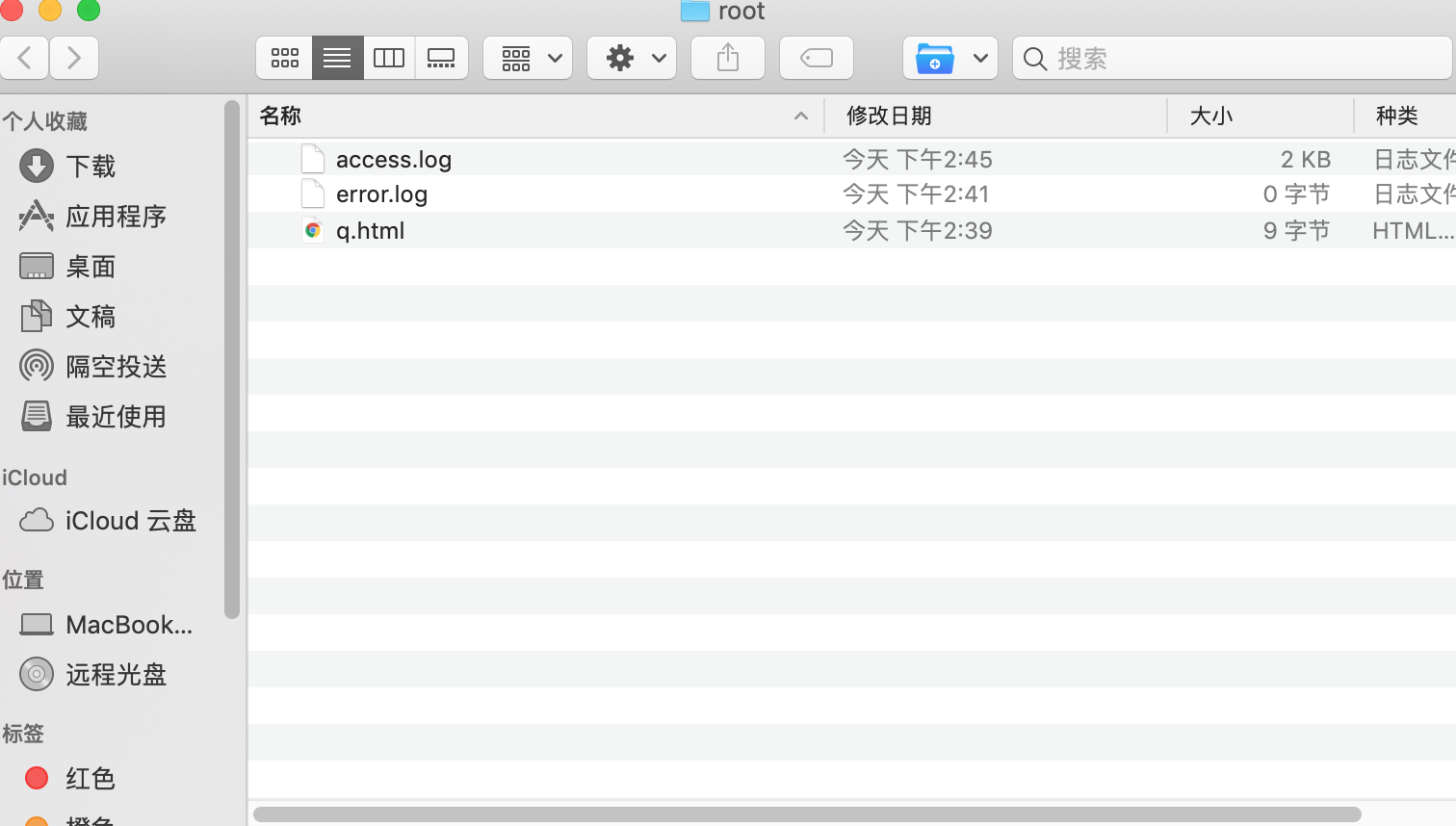
server {
listen 80;
server_name test.nginx.com;
access_log /Users/healerjean/Desktop/root/access.log main;
error_log /Users/healerjean/Desktop/root/error.log warn;
root /Users/healerjean/Desktop/root/ ;
location / {
rewrite /last/ /q.html last;
rewrite /break/ /q.html break;
}
location = /q.html {
return 400;
}
}
- 浏览器访问 http://test.nginx.com/q.html

- 浏览器访问 http://test.nginx.com/last/ http://test.nginx.com/last/fasdf

- 浏览器访问 http://test.nginx.com/break/ http://test.nginx.com/break/fasdfa

2.9.1.2、总结
访问/last/时重写到/q.html,然后使用新的uri再匹配,正好匹配到locatoin = /q.html然后返回了400
访问/break时重写到/q.html,由于返回了break,则直接停止了
2.9.2、permanent 测试
server {
listen 80;
server_name test.nginx.com;
access_log /Users/healerjean/Desktop/root/access.log main;
error_log /Users/healerjean/Desktop/root/error.log warn;
root /Users/healerjean/Desktop/root/ ;
location / {
rewrite /permanent/ /q.html permanent;
}
}
浏览器输入: http://test.nginx.com/permanent/,会自动调整成 http://test.nginx.com/q.html

2.9.3、其他说明
$ 匹配字符串的结尾 $1 正则变量的值,$1表示第一个()内的正则匹配内容,$2为第二个
last和break一般作用于server内部,不要使用域名重写它,这样浏览器会显示域名
server {
listen 80 ;
server_name test.nginx.com ;
proxy_set_header Host $host;
proxy_set_header X-Real-IP $remote_addr;
proxy_set_header REMOTE-HOST $remote_addr;
proxy_set_header X-Forwarded-For $proxy_add_x_forwarded_for;
return 301 http://graceway.m.duoqugame.net$request_uri;
# 最早支持的写法
# rewrite ^(.*)$ https://$host$1 permanent;
# 这是nginx最新支持的写法
# return 301 https://$host$request_uri;
}
2.9.3.1、根据不同浏览器地址重写
if ($http_user_agent ~* "Firefox") {
rewrite ^(.*)$ /NginxFirefoxRewrite/$1 break;
}
2.9.3.2、 $host根据域名地址重写
if ($host = www.liuli.com' ) {
rewrite ^/(.*)$ http://www.heaeljean.com/$1 permanent;
}
2.10、nginx限速
优先下载10m的内容,当下载到10m后开始,限速10k 这里面有提供下载的资源
location /NginxDownLoad {
limit_rate_after 10m;
limit_rate 10k;
}
2.11、负载均衡
设备的状态有:
1、down 表示单前的server暂时不参与负载
2、weight 权重,默认为1。 weight越大,负载的权重就越大。
3、max_fails 允许请求失败的次数默认为1。当超过最大次数时,返回proxy_next_upstream 模块定义的错误
4、fail_timeout max_fails次失败后,暂停的时间。
5、backup 备用服务器, 其它所有的非backup机器down或者忙的时候,请求backup机器。所以这台机器压力会最轻。-
upstream backend {
server 127.0.001:8010 weight=1 max_fails=2 fail_timeout=30s;
server 127.0.0.1:8011 weight=1 max_fails=2 fail_timeout=30s;
}
server {
listen 80;
proxy_set_header Host $host:8010;
proxy_set_header X-Forwarded-For $remote_addr;
proxy_set_header X-Real-IP $remote_addr;
location / {
proxy_pass http://backend;
}
}
2.11.1、轮询(weight=1)
解释:默认选项,当weight不指定时,各服务器weight相同, 每个请求按时间顺序逐一分配到不同的后端服务器,如果后端服务器down掉,能自动剔除。
upstream bakend {
server 192.168.1.10;
server 192.168.1.11;
}
2.11.2、weight 权重
解释:指定轮询几率,weight和访问比率成正比,用于后端服务器性能不均的情况。 如果后端服务器down掉,能自动剔除。 比如以下配置,则1.11服务器的访问量为1.10服务器的两倍。
upstream bakend {
server 192.168.1.10 weight=1;
server 192.168.1.11 weight=2;
}
2.11.3、ip_hash
解释:每个请求按访问ip的hash结果分配,这样每个访客固定访问一个后端服务器,可以解决session不能跨服务器的问题。
如果后端服务器down掉,要手工down掉。
upstream resinserver{
ip_hash;
server 192.168.1.10:8080;
server 192.168.1.11:8080;
}
2.11.4、 fair(第三方插件)
解释:按后端服务器的响应时间来分配请求,响应时间短的优先分配。
upstream resinserver{
server 192.168.1.10:8080;
server 192.168.1.11:8080;
fair;
}
2.11.5、url_hash(第三方插件)
解释:按访问url的hash结果来分配请求,使每个url定向到同一个后端服务器,后端服务器为缓存服务器时比较有效。
upstream resinserver{
server 192.168.1.10:8080;
server 192.168.1.11:8080;
hash $request_uri;
hash_method crc32;
}
2.12、不停网更新
upstream backend {
server 192.168.198.128:8080 weight=1;
server 192.168.198.128:8090 weight=4;
server 192.168.198.128:8091 backup;
}
server {
listen 80;
server_name localhost;
location / {
root html;
index index.html index.htm;
proxy_pass http://backend;
}
-
服务器1、服务器2和服务器3都正常启动,我刷新页面,会按照权重规则请求服务器1和服务器2,并不会请求服务器3(备份服务器)。
-
接下来我把服务器1停掉,服务器2和服务器3都正常启动,我刷新页面,这个时候所有请求都是服务器2,也并不会请求服务器3(备份服务器)。
-
接下来我把服务器1、服务器2都停掉,服务器3正常启动,我刷新页面,所有请求都转发到服务器3(备份服务器),看图片:
-
我再次依次启动服务器1和服务器2,所有请求都又按照权重规则分配了。在你所有正常服务器都挂掉时,系统依然高可用,这就是备份服务器的用处!
2.13、添加多个conf文件
1、在nginx安装目前下 新建 vhost 文件夹,在文件下创建 *.conf 的文件 ,如 video.haile.com.conf ,命名规则大多以域名的方法来命名文件。
2、编辑 conf 文件,把我们平常放在 nginx.conf 里的 server{...} 段复制过来直接粘贴到 conf 里。
3、在 nginx.conf 的 http{...} 段中加入 include E:/nginx-1.8.1/vhosts/*.conf;
注:这里 include 需要用到全路径,且文件后缀是用 conf
2.14、变量说明
#设置主机头和客户端真实地址,以便服务器获取客户端真实IP
#后端的Web服务器可以通过X-Forwarded-For获取用户真实IP
proxy_set_header Host $host;
proxy_set_header X-Real-IP $remote_addr;
#记录远程的ip
proxy_set_header X-Forwarded-For $proxy_add_x_forwarded_for;
3、域名配置
#user nobody;
worker_processes 1;
#error_log logs/error.log;
#error_log logs/error.log notice;
#error_log logs/error.log info;
#pid logs/nginx.pid;
events {
worker_connections 1024;
}
http {
include mime.types;
default_type application/octet-stream;
#log_format main '$remote_addr - $remote_user [$time_local] "$request" '
# '$status $body_bytes_sent "$http_referer" '
# '"$http_user_agent" "$http_x_forwarded_for"';
#access_log logs/access.log main;
sendfile on;
#tcp_nopush on;
#keepalive_timeout 0;
keepalive_timeout 65;
#gzip on;
server {
listen 80;
server_name localhost;
#charset koi8-r;
#access_log logs/host.access.log main;
location / {
root html;
index index.html index.htm;
}
#error_page 404 /404.html;
# redirect server error pages to the static page /50x.html
#
error_page 500 502 503 504 /50x.html;
location = /50x.html {
root html;
}
# proxy the PHP scripts to Apache listening on 127.0.0.1:80
#
#location ~ \.php$ {
# proxy_pass http://127.0.0.1;
#}
# pass the PHP scripts to FastCGI server listening on 127.0.0.1:9000
#
#location ~ \.php$ {
# root html;
# fastcgi_pass 127.0.0.1:9000;
# fastcgi_index index.php;
# fastcgi_param SCRIPT_FILENAME /scripts$fastcgi_script_name;
# include fastcgi_params;
#}
# deny access to .htaccess files, if Apache's document root
# concurs with nginx's one
#
#location ~ /\.ht {
# deny all;
#}
}
# another virtual host using mix of IP-, name-, and port-based configuration
#
#server {
# listen 8000;
# listen somename:8080;
# server_name somename alias another.alias;
# location / {
# root html;
# index index.html index.htm;
# }
#}
# HTTPS server
#
#server {
# listen 443 ssl;
# server_name localhost;
# ssl_certificate cert.pem;
# ssl_certificate_key cert.key;
# ssl_session_cache shared:SSL:1m;
# ssl_session_timeout 5m;
# ssl_ciphers HIGH:!aNULL:!MD5;
# ssl_prefer_server_ciphers on;
# location / {
# root html;
# index index.html index.htm;
# }
#}
}
3.1、地址重写
server {
listen 80 ;
server_name duodian.cai.dangqukeji.cn ;
proxy_set_header Host $host;
proxy_set_header X-Real-IP $remote_addr;
proxy_set_header REMOTE-HOST $remote_addr;
proxy_set_header X-Forwarded-For $proxy_add_x_forwarded_for;
return 301 http://graceway.m.duoqugame.net$request_uri;
# 最早支持的写法
# rewrite ^(.*)$ https://$host$1 permanent;
# 这是nginx最新支持的写法
# return 301 https://$server_name$request_uri;
# return 301 https://$host$request_uri;
}
3.2、反向代理
server {
listen 80;
server_name xiaodang.m.duoqushop.com;
proxy_set_header Host $host;
proxy_set_header X-Real-IP $remote_addr;
proxy_set_header REMOTE-HOST $remote_addr;
proxy_set_header X-Forwarded-For $proxy_add_x_forwarded_for;
location / {
proxy_pass http://proxy.m.fqapps.com;
}
}
3.3、负载均衡
upstream mysite {
server 47.104.466.466:8080 ;
server 47.104.122.122:8080 backup;
}
server {
listen 80;
server_name server.healerjean.cn;
proxy_set_header Host $host;
proxy_set_header X-Real-IP $remote_addr;
proxy_set_header REMOTE-HOST $remote_addr;
proxy_set_header X-Forwarded-For $proxy_add_x_forwarded_for;
location / {
proxy_pass http://mysite;
}
}
2.4、部署前端代码(root.txt可以直接放到目录下面)
server {
listen 80;
server_name info.healerjean.cn infomsg.healerjean.cn infoquan.healerjean.cn ;
root /usr/local/VueWebInfoProject/;
index index.html,index.htm;
proxy_set_header Host $host;
proxy_set_header X-Real-IP $remote_addr;
proxy_set_header REMOTE-HOST $remote_addr;
proxy_set_header X-Forwarded-For $proxy_add_x_forwarded_for;
location / {
try_files $uri /index.html;
}
}
2.5、验证根目录已经返回我自己的文字
server {
listen 80;
server_name kequyh.m.dangquyouhui.cn ;
proxy_set_header Host $host;
proxy_set_header X-Real-IP $remote_addr;
proxy_set_header REMOTE-HOST $remote_addr;
proxy_set_header X-Forwarded-For $proxy_add_x_forwarded_for;
location = /root.txt {
default_type text/html;
return 200 '32f9262143d2479080df590b3cff55f4';
}
location / {
proxy_pass http://proxy.m.fqapps.com;
}
}
2.6、同时配置前后端访问
upstream backend {
server 10.10.10.10:8031 weight=1 max_fails=2 fail_timeout=30s;
server 10.10.10.11:8031 weight=1 max_fails=2 fail_timeout=30s;
}
server {
listen 9999;
#如果端口不会冲突 可以不写 server_name 120.131.9.128;
access_log /usr/local/service/log/nginx/scf_manager.log ;
proxy_set_header Host $host:9999; # host一般只有域名,没有端口,
proxy_set_header X-Forwarded-For $remote_addr;
proxy_set_header X-Real-IP $remote_addr;
root /usr/local/service/app/scf/scf-manager-webapp/;
location ~ ^/api/ {
set $xlocation 'fintech'; # 配置一个变量
proxy_pass http://backend;
}
location / {
try_files $uri $uri/ /index.html;
}
location ~ ^/\. {
deny all;
}
error_page 500 502 503 504 /50x.html;
proxy_intercept_errors on;
location = /50x.html {
root html;
}
}
2.7、本地配置前后端项目
server {
listen 80;
server_name scf-manage-web;
#后台
location /api {
proxy_set_header Host $host;
proxy_set_header X-Real-IP $remote_addr;
proxy_set_header X-Forwarded-For $proxy_add_x_forwarded_for;
proxy_buffering off;
proxy_pass http://127.0.0.1:8084/api;
proxy_set_header Cookie $http_cookie;
}
# 前端
location / {
proxy_set_header X-Forwarded-For $proxy_add_x_forwarded_for;
proxy_buffering off;
proxy_pass http://127.0.0.1:8086;
proxy_set_header Cookie $http_cookie;
}
}


